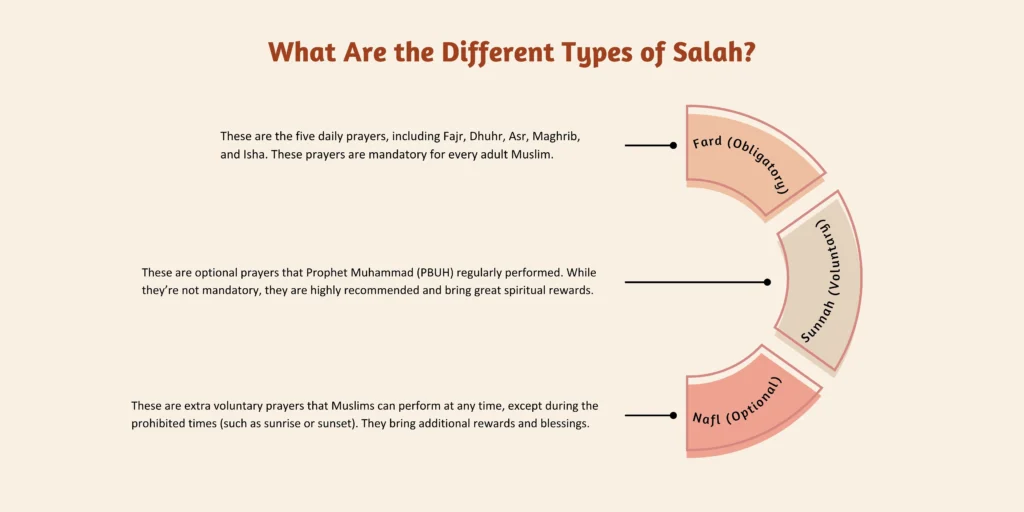Performing Salah, or prayer, is a fundamental practice for Muslims around the world. It serves as a direct connection to Allah, guiding Muslims in their daily lives. Whether you’re new to Islam or simply looking to refine your prayer practices, this simple guide provides step-by-step instructions tailored to Muslims living in the USA, UK, and Canada. Learn the essential steps for performing Salah correctly, from preparing for prayer with Wudu to understanding the different types of prayers (Fard, Sunnah, Nafl) and how to manage prayer times in your region. This guide ensures that you can perform Salah with ease, no matter where you are.
Why is Salah So Important in Islam?

Salah is one of the Five Pillars of Islam and holds profound spiritual significance for every Muslim. Performing Salah five times a day is more than just fulfilling a religious obligation; it’s a way to stay connected to Allah and constantly seek His guidance and mercy.
The Prophet Muhammad (PBUH) said:
“The first thing that the servant will be accountable for on the Day of Judgment is his prayer. If it is good, then he will be successful, and if it is corrupt, then he will fail.”
(Sunan al-Tirmidhi)
Beyond the spiritual benefits, Salah promotes discipline, mindfulness, and humility. By taking time out of your day to pray, you are reminded of the greater purpose in life, helping you stay grounded spiritually and emotionally.
Salah also strengthens the bond between Muslims worldwide, as it’s the same set of prayers performed by millions, regardless of location. Whether in the USA, UK, Canada, or anywhere else, Muslims pray in unity, which brings a sense of community and solidarity.
What Are the Different Types of Salah?

Understanding the different types of Salah is essential for any Muslim. There are three main categories
Fard (Obligatory)
These are the five daily prayers, including Fajr, Dhuhr, Asr, Maghrib, and Isha. These prayers are mandatory for every adult Muslim.
Sunnah (Voluntary)
These are optional prayers that Prophet Muhammad (PBUH) regularly performed. While they’re not mandatory, they are highly recommended and bring great spiritual rewards.
The Prophet Muhammad (PBUH) said:
“Whoever prays twelve Rak’ahs in a day and night, Allah will build for him a house in Paradise.”
(Sahih Muslim)
Nafl (Optional)
These are extra voluntary prayers that Muslims can perform at any time, except during the prohibited times (such as sunrise or sunset). They bring additional rewards and blessings.
How to Perform Salah | Step-by-Step Guide
Performing Salah correctly is crucial for fulfilling your religious duties. Below is a clear, step-by-step guide to help you learn how to perform Salah.
Niyyah (Intention)
Before beginning any prayer, you must have a sincere intention (niyyah) in your heart. The intention should be made purely for the sake of Allah, signaling that this act is done in devotion and worship.
Takbir al-Ihram (Opening the Prayer)
To start Salah, raise both hands to shoulder level and say “Allahu Akbar” (Allah is the Greatest). This signifies the beginning of your prayer.
Qiyam (Standing Position)
While standing, recite Al-Fatiha (the Opening Surah of the Quran) followed by another Surah or verses from the Quran. This is the time to focus and reflect on the words you are reciting. Learning how to read the Quran properly is essential for this step, and you can refine your Quranic recitation with personalized guidance from our Quran Reading Course.
Ruku (Bowing)
After reciting the Quranic verses, bow down (Ruku) and keep your back straight. Say, “Subhana Rabbiyal Adheem” (Glory is to my Lord, the Most Great).
I’tidal (Standing Again)
Stand upright again, saying, “Sami’ Allahu liman Hamidah, Rabbana lakal hamd” (Allah hears the one who praises Him, and to You is all praise).
Sujood (Prostration)
Next, go into prostration. Place your forehead, nose, hands, knees, and toes on the ground, saying, “Subhana Rabbiyal A’la” (Glory is to my Lord, the Most High).
Jalsa (Sitting)
Sit briefly after the first prostration and say, “Rabbighfir li” (O Lord, forgive me). This sitting position allows you to rest before the next prostration.
Second Sujood
Repeat the prostration for the second time, saying the same words as before: “Subhana Rabbiyal A’la”.
Tashahhud (Testification)
After the second prostration, sit and recite the Shahada (testimony of faith): “Ashhadu alla ilaha illallah wahdahu la sharika lahu wa ashhadu anna Muhammad abduhoo wa rasooluh” (I bear witness that there is no god but Allah, and Muhammad is His servant and messenger).
Salam (Ending the Prayer)
To conclude the prayer, turn your head to the right and then to the left, saying “Assalamu Alaikum wa Rahmatullah” (Peace and blessings be upon you).
How to Do Wudu for Salah?
Wudu (ablution) is necessary before performing Salah to ensure cleanliness. Here’s how you can do Wudu:
- Wash your hands up to the wrists.
- Rinse your mouth and nose with water.
- Wash your face.
- Wash your arms up to the elbows.
- Wipe your head.
- Wash your feet up to the ankles.
Note: If you break your Wudu (by using the restroom or sleeping), you must renew it before Salah.
What Should You Wear for Salah?
To perform Salah, you must wear modest and clean clothing. Men should cover from the navel to the knees, and women should cover their entire body, except for their face, hands, and feet. The clothing should be loose, non-transparent, and comfortable to allow for easy movement during prayer.
How to Perform Salah in the USA, UK, and Canada?
Performing Salah in non-Muslim countries like the USA, UK, and Canada may come with its unique challenges, such as prayer times, finding prayer spaces, and managing work/school schedules. However, the steps for Salah remain the same.
Prayer Times
The timing for Salah depends on the position of the sun. You can use mobile apps such as Muslim Pro or Islamic Finder to determine prayer times for your location.
Praying at Home
If you can’t attend the mosque, create a clean and quiet space at home to pray. You can pray individually or with your family.
Praying at Work or School
If you’re at work or school, try to find a private space to perform your prayers. Many Muslims manage their prayer times by taking breaks or adjusting their schedules.
How to Perform Salah in Congregation (Jama'ah)?
Praying in a group (Jama’ah) is highly recommended as it brings greater rewards. You can join the congregation at a mosque or even with your family at home.
Virtual Salah is also an option for Muslims who are unable to attend the mosque. Many mosques and online platforms offer group prayer services.
Common Mistakes in Salah and How to Avoid Them
Incorrect Posture
Ensure that your back is straight during Ruku and I’tidal.
Forgetting to Recite Al-Fatiha
This Surah is essential in every Rak’ah.
Being Distracted
Maintain full focus during each prayer and avoid distractions.
Breaking Wudu
Always check that your Wudu is valid before praying.
Why You Should Make Salah a Daily Habit
Salah is not just an act of worship; it’s a comprehensive practice that nurtures your relationship with Allah. By incorporating Salah into your daily routine, you can enjoy spiritual, mental, and physical benefits. Regular Salah helps you stay connected to Allah, creates peace of mind, and fosters a disciplined lifestyle.
Start Practicing Salah Today
Begin your journey toward perfecting your Salah with our easy-to-follow, step-by-step guide. Whether you’re just starting or looking to improve your practice, Safdriya Quran Academy offers comprehensive online classes and resources tailored to help you strengthen your Salah.
F.A.Q.
Salah steps are the same everywhere. Use apps or local mosque schedules for prayer times specific to your location.
Yes, you can pray at home, work, or any clean, quiet space. Just ensure you face the Qibla and follow the prayer steps.
Perform the missed prayer as soon as possible. If the next prayer time arrives, perform the current one first, then make up the missed prayer.
Pray in a quiet place, recite with understanding, and minimize distractions. Regular practice will help improve focus.
Yes, you can perform Salah while traveling, even adjusting for time zone differences. Use prayer time calculators for accurate timings.
Yes, it is mandatory to recite Al-Fatiha in every Rak’ah of Salah. Make sure to memorize it for proper prayer.
Salah during Ramadan is the same, with the addition of Taraweeh prayers after Isha at night.



